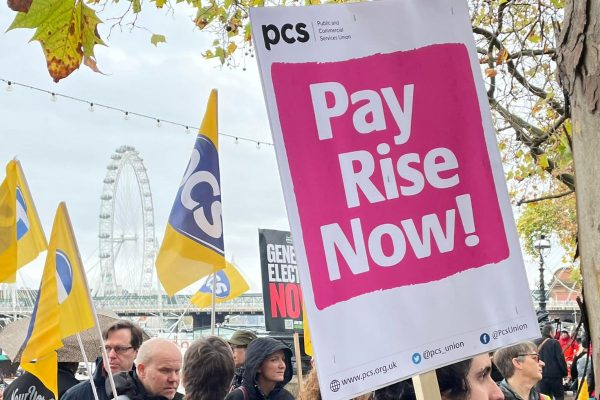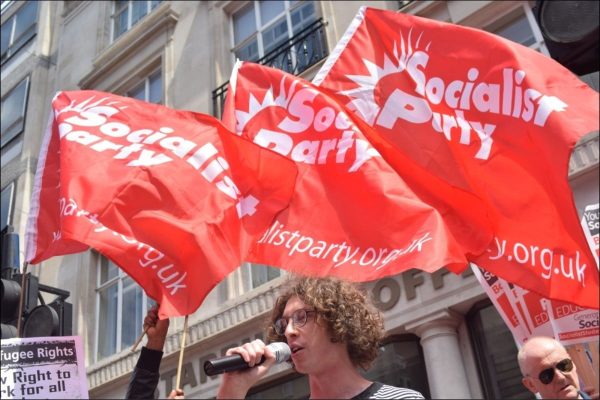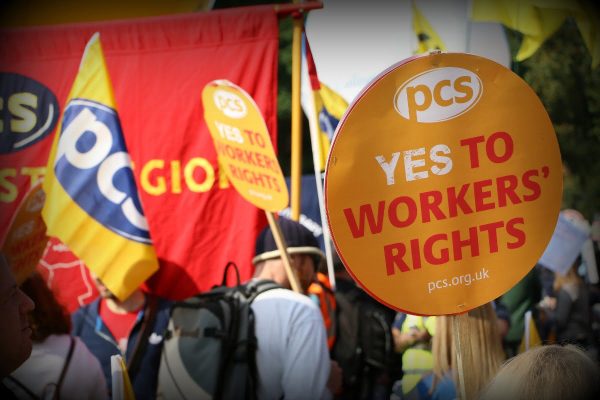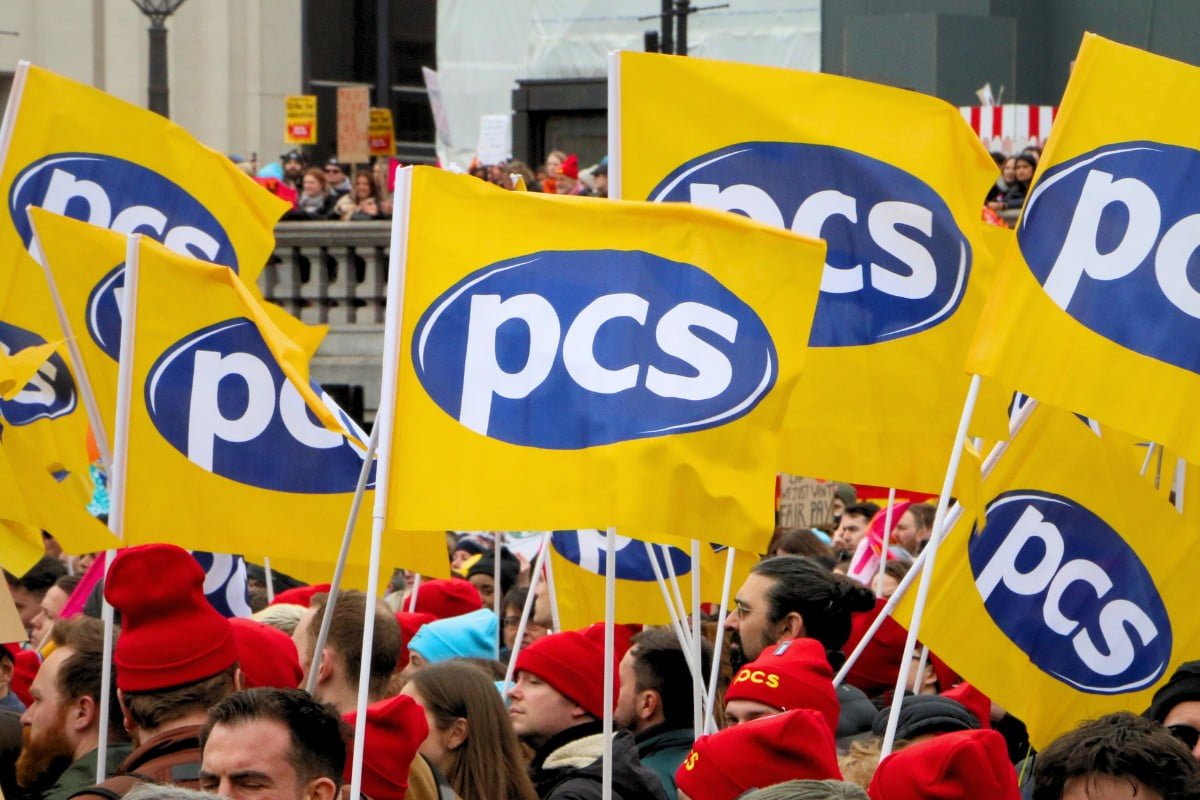Members of the Public and Commercial Services (PCS) union are in the process of electing a new general secretary and assistant general secretary. Ballots are in the post, with voting set to begin on 9 November and close on 14 December.
This election comes on the heels of a year of sharp struggle for civil servants and other public sector workers. And the coming months and years are likely to see further battles.
Earlier this autumn, at the Tory Party conference, Chancellor Jeremy Hunt announced that the government intends to ‘shrink’ the civil service by a total of 66,000 jobs, via a hiring freeze. The next pay campaign is also due to kick off before next April.
In these elections, Socialist Appeal is calling for a vote for the Left Unity (LU) candidates: Fran Heathcote for general secretary (GS) and Paul O’Connor for assistant general secretary (AGS).
Heathcote, the current union president, is a well-known and experienced figure on the union’s left. Similarly, Paul O’Connor has a considerable track record of his own.
We believe that Heathcote and O’Connor are the best candidates to take the union into battle in the coming period.
Left Unity

LU supporters have held the leadership of PCS for over 20 years, after successfully defeating the old right wing of the union, who had ruled the roost for years to the great detriment of members.
In this time, these left leaders have overseen efforts to defend the union from attack, including successfully resisting the notorious check-off system. And they have an important role in the wider movement, initiating the 2011 pensions strike and more.
The pay campaign and strikes fought earlier this year also saw the union change tack – from the one-day strikes of the past, to more concerted, targeted walkouts. PCS also led the call for coordinated action across the trade union movement. Both were popular moves amongst the ranks of the union.
This strategy also clearly shook the government, who eventually offered an improved pay deal, though one that was still below-inflation.
“In our dispute, we didn’t get what we originally wanted,” stated Serwotka, speaking to Tribune in September, “but we won more than they would have given us if we hadn’t taken action.”
Following consultation amongst members, including a ballot that saw 90% back the leadership’s proposal to pause the action, a truce was agreed.
Further, the absence of any significant grassroots campaign to continue the fight, unlike in other public sector unions such as the RCN, showed that the rank and file largely supported the PCS leaders’ call, and that there was no real mood to pursue further strike action in the immediate term.
Pausing the strikes, however, was always intended to provide an opportunity for members to regroup and redouble efforts to fight on a departmental basis. Where this was done, in some instances, pay increases were won well above the 4.5% offered by the government.
Now the union needs to recover this momentum and build on these gains.
Heathcote and O’Connor are justified in pointing to LU’s track record. But it will be in how the union builds upon the partial victories of the past year – and leads the union in upcoming struggles, whether against job cuts or for higher pay – that its future is secured.
Already, outgoing general secretary Mark Serwotka has said the union will demand full pay restoration and inflation-busting pay rises for civil servants from a Starmer Labour government.
These are exactly the kind of bold demands that an incoming LU leadership must fight for, backed up with concrete action.
Sectarianism

Unfortunately, not everyone sees these challenges facing the union in the same way. This includes various sectarian groups, who have taken this opportunity to launch their own electoral bids.
An agreement exists between the Socialist Party (SP) and the Alliance for Workers’ Liberty, centred around the candidacies of Marion Lloyd and John Moloney for GS and AGS respectively. The Socialist Workers Party also backs Lloyd for general secretary.
These candidates have criticised their LU opponents on a number of tactical and strategic questions. This is par for the course in any union election.
But coming from the SP in particular, whose own track record in the union is scandalous to say the least, such criticisms are absurd. And this is before mentioning their class collaborationist shenanigans in other unions, such as Unison, where they worked with the employers to help sack prominent trade unionist and left leader Paul Holmes.
The last time that an SP-backed candidate held a significant leadership position in the union was when Chris Baugh was AGS. Notably, he was originally elected on a LU ticket. But while in office, Baugh consistently undermined the wider leadership through gossip and slander.
Worker’s wage
The SP has also made a great deal of noise over the question of a worker’s wage in this current election.
This relates to the demand that a left candidate, if elected, should take the wage of the workers they represent, so that material privilege does not separate them from the rank-and-file members they are supposed to be fighting for.
Socialist Appeal has always backed this position. We maintain that trade union leaders – and all workers’ representatives and officials – should abide by this.
Coming from the SP, however, such tub-thumping is risible. For one, as AGS, Baugh never took a worker’s wage. In fact, he didn’t even contribute to the union’s strike fund!
Prepare for battle

It is clear from the candidates presented – and from the balance sheet of LU’s time in office – that Heathcote and O’Connor are the best candidates to lead PCS into the coming period.
The strike wave of 2022-23 was only the beginning of the reawakening of the British working class. The Tories, and the bosses that back them, are clearly worried by this prospect, and are looking to wage war on workers and their organisations.
Starmer’s Labour has similarly indicated that they too will loyally carry out the attacks on workers that the capitalists demand.
PCS has a vital role to play in the class battles that loom on the horizon in Britain.
To fulfil this role, and prepare for the fight ahead, the union needs a strong left leadership, capable of galvanising and organising rank-and-file members. And it needs a wide base of grassroots activists, capable of convincing and mobilising members on the ground, in workplaces.
The current leadership campaign, therefore, should also be a springboard for strengthening Left Unity as a whole, with LU candidates drawing new, fresh layers of workers into the activity and structures of the union grouping on the basis of bold socialist policies and a clear fighting strategy.
On the other hand, if the union’s leadership was to fall into the hands of unprincipled, self-interested sectarians, this would be a terrible blow – not only for PCS members, but for the trade union movement as a whole.
For all these reasons, we call for a vote for Heathcote and O’Connor, so that PCS can play the important role that is required of it – that of a militant, fighting-fit union, capable not only of defending its members, but of advancing the interests of the whole labour movement.
PCS members who want such a union should support Heathcote and O’Connor, and mobilise to ensure their victory in these elections.






